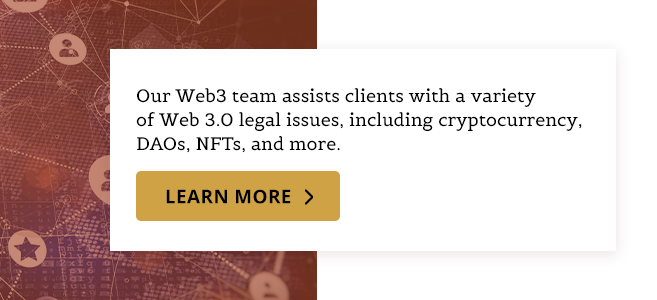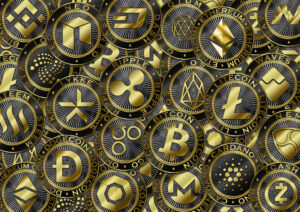Recently we have been drafting and reviewing NFT (non-fungible token)-related contracts for our clients. Some of our projects involved operating agreements for NFT companies and their owners. Others involved contracts for NFT companies with their investors or consultants. And because NFTs are intellectual property, we have also been involved in registering trademarks and preparing agreements involving licensing aspects. In this post, I focus on NFT studio contracts for outside consultants.
If you are an NFT consultant or an NFT company thinking of hiring a creative consultant, then this post is for you. Companies hire consultants because they do not have the expertise in-house, do not have the budget to hire a full-time employee to fill that role, or want to prove a business concept with minimal risk.
NFT Contract Negotiation From the Company’s Perspective
Many new NFT studio companies are hiring either technical or talent consultants, depending on the type of NFT company. The pool of technical consultants is larger than the pool of talent or creative consultants, so many NFT companies are made up of technologically-savvy folks looking for brand ambassadors, creative consultants, and bizdev experts. Sometimes they can find a person that checks all of these boxes.
Talent consultants are either talent themselves (think athletes like Steph Curry, celebrities like Paris Hilton, artists like All Seeing Seneca, and musicians like Kings of Leon) or they understand the talent world. Some entrepreneurial folks are both.
NFT Contract Negotiation From the Consultant’s Perspective
Consultants (sometimes called creators) are often hired on an hourly basis unless they have a unique skill set or network that the NFT company needs. In those instances, an influencer or creator may be able to propose an equity or quasi-equity component to the arrangement. Experienced entrepreneurs are loath to give up equity if they can avoid it. Often with creative consultants, they are willing to be more flexible.
Where creators are athletes, celebrities, artists, musicians, or other influencers in their own right, these NFT studio contracts are generally on a part-time (project by project basis) and exclusive basis. This exclusivity component runs in both directions. Exclusivity is very important to the NFT studio because it does not want its creator in X industry to lend her or his influence to a competitor. The creator also wants exclusivity because she or he does not want to be supplanted by a “bigger” celebrity.
What Matters in NFT Studio Contracts?
NFT studio contracts mirror influencer agreements, except the intellectual property component of these contracts is paramount (more below on that).
First, these are some of the normal issues that need to be negotiated:
Compensation.
- Will this be pre-fundraising or post-raise?
- Will the creator get a finder’s fee for bringing their influencer friends to the NFT studio or helping to promote their own NFTs or other NFTs?
- If the influencer will receive additional performance-based compensation, will it be straight monetary compensation or royalty-sharing?
Performance Benchmarks.
- I prefer a mixture of time-based and performance-based benchmarks coupled with various vesting schedules. NFT drops are often a primary benchmark that triggers compensation to both sides.
- The performance schedule can be simple or as complex as needed and should include catch-up and cure provisions due to the busy nature of an influencer’s calendar.
Termination.
- Every contract should contain strong and clear termination criteria, and it should be balanced between the NFT studio and the consultant.
- Whether the equity grants vest at termination is often hotly negotiated.
Exclusivity.
- If the relationship is not 100% exclusive, then the consultant often wants to negotiate most favored nation treatment with respect to any additional consultants, even if they are in other specialty industries.
- What is deemed competitive behavior? (Owning NFTs? Selling NFTs? Developing relationships with other web3 companies? Performing in the metaverse?)
Job Title.
- Creative artists are often very concerned with their titles reflecting well on them. Chief Creative Director is a commonly used title, especially for creators who are helping make content for other influencers.
Where more than one creator is affiliated with an NFT studio, the title may reflect that (e.g. Chief Creative Director of Athletic Content).
Additional Collaboration.
- NFT studios want to create, promote, and sell popular NFTs in collaboration with their talent consultants. Forward-thinking NFT studios also want to help increase the consultant’s fan base community.
- Some NFT studios are run like a venture studio, where they build other businesses from the ground up, including providing capital, expertise, connections, and person power.
- The more collaboration between the studio and the artist or influencer, the more these relationships start to look and feel like joint ventures. The compensation structure often reflects this type of relationship.
Intellectual Property Rights.
Last, intellectual property rights matter more in these NFT studio contracts because the creative process is often collaborative and iterative, with unique and original intellectual property being created in every part of the process. This makes creators nervous because they must maintain absolute control of their name, image, and likeness, and they do not want the NFT studio interfering negatively with their business relationships and their fan base.
NFT studios get concerned because the technical IP creation infrastructure is all theirs, and they are often investing significant development talent into the relationship with the creator.
NFT studio contracts are often a combination of two-way services agreements, intellectual property licensing agreements, and joint venture agreements. Cryptocurrencies are always in the conversation. These relationships will continue to morph as web3 matures.

























